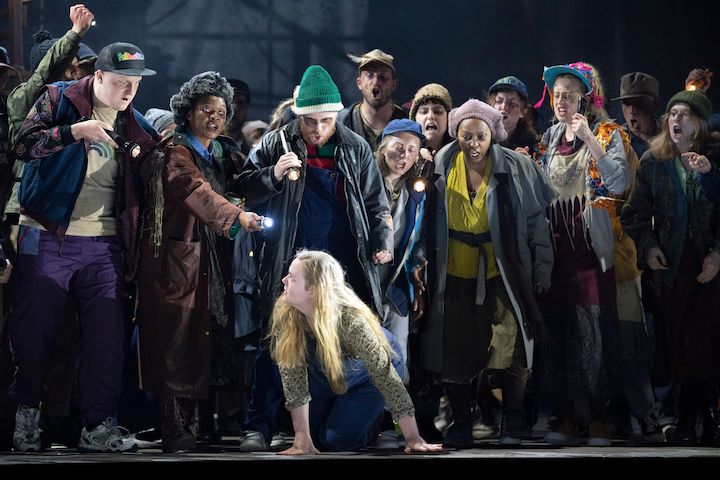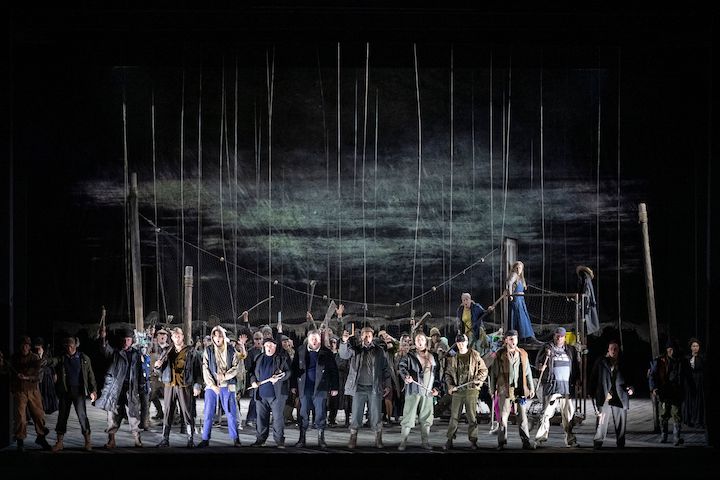The Wreckers: Ethyl Smyth, Glyndebourne
Seeing and hearing something for the first time always carries an extra level of excitement, whether it is theatre or opera and on this occasion, coming to it with no knowledge of either the score or the story I was filled with anticipation. Much as I love seeing and hearing my favourites time after time, knowing how things turn out is rather a pity. And delving into a plot synopsis does much the same. So on this occasion I resisted and went in unprepared, after all, the supertitles can keep you apace of the story.

Thurza (Karis Tucker) with members of the Glyndebourne Chorus. © Glyndebourne Productions Ltd. Photo: Richard Hubert Smith
Familiar with some of Smyth’s other work, this was new to me and from the opening storm of music I was captivated. Why her work has been for the most part ignored or neglected, beyond the accepted sexism, it beggars belief. This is stirring stuff, filled with drama and colour and peppered with moving arias, solos, duets and more.
But it is in the massive full chorus work that Smyth really shines and so too do the Glyndebourne chorus who here are challenged with a dense and demanding score that sees them at their very best. And it’s not just their vocal best, this massive chorus are dealing with complex stage movement on a massive revolve that requires a precision of placement that beggars belief at times.
And that staging is equally impressive, a simplistic open stage with use a few posts to signify the coastal Cornish setting is brought to live by brooding projections of oppressive sky and waves. These are further brought to life by the presence of four mysterious black clad women, dressed in Victorian dress in contrast to the contemporary costumes of the rest of the cast. But who are they? The ghosts of the dead perhaps or are they the dark and dangerous sea itself, rolling in like waves and delivering the deadly spoils of the stormy waves. Their presence become dark and more poignant as the story unfolds.
And what a story, dark hardly touches the sides. These coastal villagers are living on the breadline and their only means of survival is the bloody and treacherous act of luring ships onto the jagged rocks and plundering them for their spoils. It’s a murderous act and one that is condoned by the lay preacher Pasko, who seemingly is unmoved by this ungodly action. Lighthouse keeper Laurent is responsible for turning off the light in the storms to make navigating the dangerous coastal waters impossible but someone is lighting beacons on the cliffs to protect passing ships.
As the story unfolds Pasko’s young wife Thurza is revealed to be in love with the young fisherman Marc who is the saviour of those passing crews. What follows is a tale of twisted morals, unrequited love and mob mentality. Accusations fly, blame is assumed and assigned as Laurent assumes the role of judge and executioner. In the end love wins out but in a deadly denouement that sees Smyth’s score reach a dramatic climax, not that it is ever short of drama and indeed passion, especially in the love scenes. Unfamiliar with her work there are striking references, possibly only there for a modern audience, who will no doubt see tastes of Bizet, Elgar and Vaughan Williams, and at times the grandeur is Wagnerian in scale. That’s not a criticism, this work stand on its own merits and it’s hard to see why it has been neglected for so many years.
The principals in this new production are for the most part excellent. Marc is sung by Rodrigo Porras Garulo with clarity and convincing passion. Karis Tucker as Thurza is equally passionate and fierce and has the same clarity. The young Avis played by Lauren Hagan, would be and rejected lover of Marc, has an appropriately youthful edge to her performance. Less convincing is Philip Horst as Pasko, the lay preacher who lacks the sense of charisma and leadership that might lead a congregation to believe that their murderous acts are justifiable.

Act 1 Scene 1 © Glyndebourne Productions Ltd. Photo: Richard Hubert Smith
The whole is conducted with verve by Robin Ticciati and the excellent direction is by Melly Still who has created a contemporary yet timeless framework for the production. At the end though the stars of this production are the Glyndebourne Chorus who in the hands of Aidan Oliver are triumphant in every sense.
The Wreckers forms part of Glyndebourne’s excellent initiative this year to redress the male to female imbalance in the arts.
Andrew Kay
The Wreckers
Glyndebourne
16 June
Rating: 
























